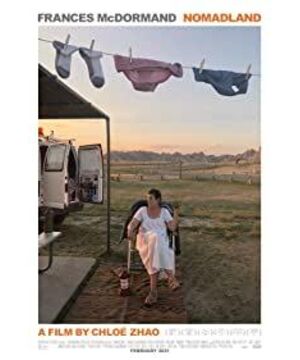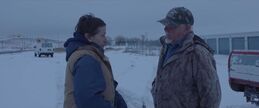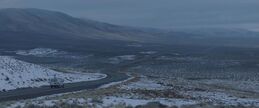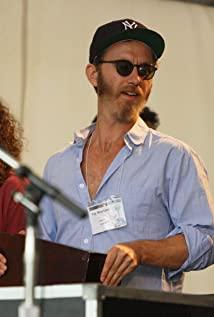The highly anticipated Zhao Ting's third feature-length feature film "Nowhere to Remain" is scheduled to debut at major film festivals this fall. Before its screening at the New York Film Festival, it has already won the Venice Golden Lion and Toronto in one fell swoop. The People's Choice Awards, the brightest star of the somewhat bleak 2020 film season. However, viewers who are familiar with the director or who have seen her previous work "The Knight" should know that "Nowhere" and previous years' "leading" films at this time (such as "Roma", "Three Billboards", etc. etc.) are different. As an independent film, it is undoubtedly much more low-key in temperament, and its topicality, ambition or distinctive directing style are not labels attached to it. So for those unprepared viewers who intend to view the film as a "popular" in the usual sense, "Nowhere" is likely to not exceed their expectations.
I myself met this American female director through the last movie "The Knight". The reason why I emphasize the United States is that, except for nationality, Zhao Ting's films have nothing to do with China, and anyone who wants to pass the "Oriental" Attempts at aesthetics to deconstruct her work are quite absurd. Whether it's "The Knight" or "No Country," they are very much "American" in nature. The attention to the marginalized, the documentary-quality images, the restrained emotions, the dilute plot, from every angle, it is a very pure American independent film. What is impressive about Zhao Ting is undoubtedly her ability to capture material and delicate sensibility, as well as the right balance between the cold reality and the poetic imagery.
Compared with "Knight", which focuses on himself played by Brady, "Nowhere" is more "ruled to follow". Based on Jessica Bruder's documentary of the same name, the film tells the story of the heroine Fern, who lost her home due to the economic depression, over a year as a nomad. The echoes of the beginning and the end, the transition of the three natural scenery, and the sublimation of the theme at the end of the film, these very neat techniques should have a lot to do with the literary base of the film. As a result, the "flesh and blood" of a character's inner struggle in "Knight" has been diluted, and the tension and empathy of the story are no longer so strong. Instead, the level of the text, the depth of the theme, and the vision of continuous expansion. After watching the whole film, it may not be the sadness of the images and characters that makes people recall it, but the stubborn and hard power behind the sadness. The more documentary style of "The Knight" is soft and emotional, while "Nowhere" is more empty and deeper.
Mrs. Cohen's extremely steady performance injects abundant emotion into the film. The "stiffness" in the structure of the film is softened and rounded by her superb performance. The film actually doesn't focus on Fern's encounter itself, but on her relationship with other homeless people and her relationship with the land and nature. To a certain extent, like us, she gradually recognized the Nomad group from the perspective of a bystander. On the vast land, the most simple connection between people shimmers with gentle brilliance. The friendship between Fern and Linda May, the mutual support between them, the friendship with Swankie, listening to her imagining death and the end of life, and the encounter with Dave's family are both intimate and distanced. ” is developed layer by layer by every “people to rely on” around the heroine. The loneliness and bravery in their respective life trajectories have become extra special and powerful through these brief and warm companionships.
The film also quietly takes us into the unknown side of the United States. Brady, who was seriously injured in "The Cavalier", ended up working as a cashier in a large supermarket. Under the bright white light, he appeared slightly Jerky operation makes people sad. In this movie, the scene is changed to an Amazon warehouse, and the same story is told. In the depths of this sophisticated capitalist machine, there are too many ordinary people like Brady and Fern, whose faces we can't see at all, maintaining its operation, and what kind of fetters and secrets are hidden in the ordinary expressions of these people , even less known. Interestingly, both "Knight" and "Nowhere" spend a lot of ink describing nature, and often place the characters in a vast world, but behind this pomp and silence, the movie is ultimately about these things. distance between people and countries. In Brady's broken "Knight's Dream", on Fern's unstoppable homeless road, we clearly see the icy appearance of this country.
Why the nomads choose to be "on the road" all the time is the core of this drama film that still follows the original intention of documenting, and this is also after the filming of "Knight", director Zhao Ting, who is a monk in Docufiction, has expanded the narrative boundary of his film. Try hard. In the previous work, Brady's experience itself can exist alone. It is no exaggeration to say that as long as the camera is in front of him for a long enough time, it is not difficult for us to read an unusually vivid and three-dimensional character. In contrast, "Nowhere" relies more on the weaving of materials and the progression of emotions, and this film has successfully achieved a deeper thinking about life on the basis of recording the lives of a special group of people. . In fact, starting from the first half of the film, it is not difficult to find that the director consciously emphasizes the expression of the homeless people's attitude towards their own life in the character dialogue. Each of them may be "forced" to go on the road at the beginning, but it is presented in our What is in front of you is always a certain firm belief, a strong self-awareness, and a gentle gesture of looking back on the past. This is followed by a very beautiful monologue about death by Swankie, "If I can see swallows around before I close my eyes, I will have no regrets in my life." Such a poetic statement is not only in nature. It's as simple as touching the scene. The short dialogue between Fern and Bob Wells at the end of the film, with reference to each other, re-examines his life and the loss and persistence he has experienced, allowing us to further understand the deeper meaning behind "on the road", which is not only a continuation of life, but also a The transcendence of death. The blow of life is not the same as the waste of life. In a picture of "eyes full of marginalized people", we can't see the "sad scenes" of cowardice, collapse and oppression. and the most sincere respect for each other.
From this point of view, "No Country" has achieved the surpassing of "Knight". Perhaps the story that has not happened to Brady has been written in advance into the life choices of everyone in "No Country". As audiences, we are also unconsciously shifting from “watching” the stories of others to maintaining a parallel state of “not disturbing each other” with the characters in the video. Everyone's experience is so unique that sometimes all it takes as a narrator is to treat each other as equals. This "Nowhere", which is not very "purposeful", has achieved this, as has Cohen's wife, who intervened in the life of the real homeless as a professional actor. In the face of these life experiences that we still neglect to feel at this moment, poetry and romance are frivolous words, but it would be the greatest disrespect to this film to easily describe them with cruelty and coldness.
View more about Nomadland reviews









